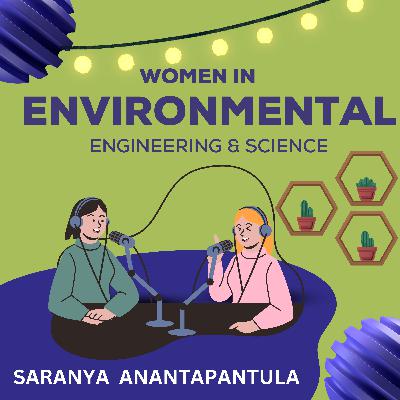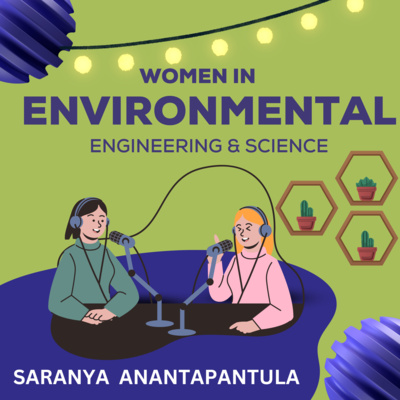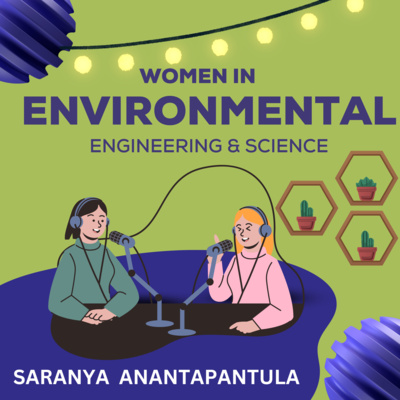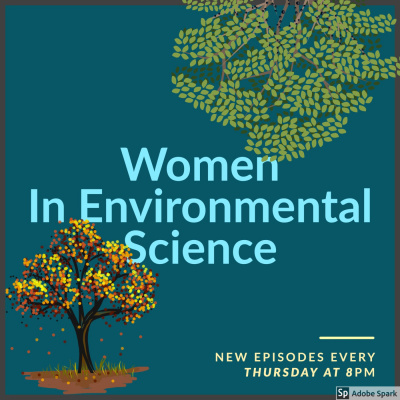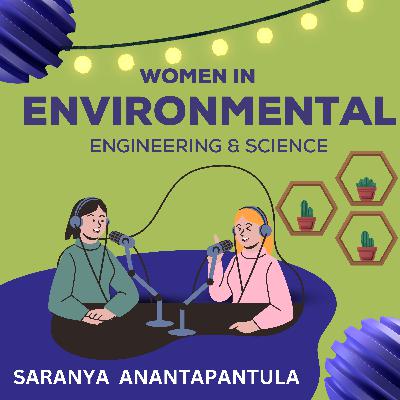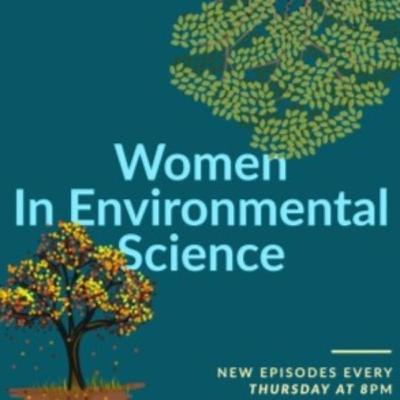Discover Women In Environmental Science & Engineering
Women In Environmental Science & Engineering

Women In Environmental Science & Engineering
Author: Saranya Anantapantula
Subscribed: 38Played: 267Subscribe
Share
© Saranya Anantapantula
Description
Currently: 13K listeners! 73% women+! 27% male supporters! 113 countries!
Let's inspire our communities and educate them on the diverse environmental issues leaders in environmental engineering/science are doing! WIESE is a space for Women+ In STEM to share the issues they face in the industry, the solutions they make, the roadblocks they push through, and what they learning to teach society to keep the environment clean! Enjoy!
Let's inspire our communities and educate them on the diverse environmental issues leaders in environmental engineering/science are doing! WIESE is a space for Women+ In STEM to share the issues they face in the industry, the solutions they make, the roadblocks they push through, and what they learning to teach society to keep the environment clean! Enjoy!
40 Episodes
Reverse
Adriana Bankston is a Senior Fellow in Civic Science & Public Policy with Sigma Xi, where she leads a project that examines science policy engagement at the state level and determines the skills, knowledge, and resources required by scientists to successfully influence public policy. Prior to this role, Adriana was a Principal Legislative Analyst at the University of California Office of Federal Governmental Relations, where she served as an advocate for the university with Congress, the Administration and federal agencies. Previously, Adriana was a Policy & Advocacy Fellow at the Society for Neuroscience. She is also currently CEO & Managing Publisher of the Journal of Science Policy & Governance, a Fellow with Advancing Research Impact in Society (ARIS), and a Biomedical Workforce & Policy Research Investigator at the STEM Advocacy Institute (SAi). In recognition of her contributions to the field, Adriana was named among the Top 20 in 2022 Advocacy practitioners by the Advocacy Association, and awarded the inaugural 2022 ARIS Emerging Broader Impacts Leader Award. Adriana earned her Ph.D. in Biochemistry, Cell and Developmental Biology from Emory University.
---
Send in a voice message: https://podcasters.spotify.com/pod/show/women-in-environment-sci/message
Danielle Becker-Polinski is currently a Ph.D. student in Dr. Hollie M. Putnam's Eco-Physiology and Environmental Epigenetics of Marine Invertebrates Lab at the University of Rhode Island. Danielle is broadly interested in the ecophysiology within coral reef ecosystems and how global climate change and genomic processes influence coral population dynamics for generations to come.
Her fascination and curiosity with the underwater world, especially coral reef ecosystems, developed into an innate passion for research-based science. To preserve these invaluable ecosystems, She believes we must bridge the gap between education, conservation, and research to convey the significance of coral reef ecosystems to the public.
Danielle's passion for coral reefs is entwined with her interest in conservation and environmental justice initiatives that understand the importance of supporting STEM education and furthering policy agendas for the future of oceanic ecosystems.
Enjoy!
---
Send in a voice message: https://podcasters.spotify.com/pod/show/women-in-environment-sci/message
Dr. Lydia Jahl is a science and policy associate at the Green Science Policy Institute. There, she collaborates with other scientists, businesses, and policymakers to reduce the use of harmful chemicals in everyday products. Dr. Jahl is a chemist by training, receiving a BS in Chemistry from Harvey Mudd College and a PhD in Chemistry from Carnegie Mellon University. Her research journey began in atmospheric chemistry, studying fog water in the Los Angeles area and the Po Valley in Italy. After a brief stint working as a research chemist at a large winery, Jahl returned to atmospheric chemistry and completed a dissertation on the atmospheric processing of biomass burning emissions. While this fundamental research is important, Dr. Jahl wanted her work to more directly improve environmental health on a shorter timescale. So, she joined the Green Science Policy Institute to work on challenging issues that directly impact both human and environmental health. Her current focus is on phasing out unnecessary uses of flame retardant chemicals and PFAS.
---
Send in a voice message: https://podcasters.spotify.com/pod/show/women-in-environment-sci/message
Dr. Nevárez-Moorillón has been a full-time professor at the School of Chemical Sciences, Autonomous University of Chihuahua, Mexico, for the last 37 years. She graduated as a bacteriological chemist from the Autonomous University of Chihuahua. She completed her Ph.D. in Biology from the University of North Texas studying the bioremediation of soil contaminated with hydrocarbons, under the supervision of Dr. Gerard Roland Vela. She is a member of the National Outstanding Researchers System of Mexico (Level II) and has been granted the National Award on Food Science and Technology. She is also a regular member of the Mexican Academy of Sciences
Her research interests include environmental microbiology, as well as predictive microbiology applied to food systems, the role of lactic acid bacteria in traditional fermented foods, and the antimicrobial properties of spices, such as clove and oregano. Under her supervision, more than 50 undergraduate students, more than 50 master's and 15 doctoral students have completed their degrees.
Dr. Nevarez-Moorillón is a member of the Institute of Food Technologists, the Society for Applied Microbiology (UK) and the American Society for Microbiology and has served as Vice-President and President for the Mexican Association of Food Sciences and the Mexican Association for Food Protection.
During the last 25 years, Dr. Nevárez-Moorillón has published more than 100 research articles, 25 book chapters and has reviewed manuscripts and research proposals for research publishers and international organizations. She is also part of the Reviewer Board of Polymers, Membranes, and Molecules (MDPI), Associate Editor in Frontiers in Sustainable Food Processing, and Academic Editor in PlosOne.
---
Send in a voice message: https://podcasters.spotify.com/pod/show/women-in-environment-sci/message
Sandy Castellano has a B.S. Earth Sciences with a Concentration in Environmental Science (graduated 2018) and an M.S. Sustainability Science (anticipated graduation Dec 2022). Currently, Castellano is a graduate student at Montclair State University and working as a teaching assistant leading two labs classes for introduction level geology. Castellano is a Latina in STEM and proudly represents Ecuador. Her family immigrated to the United States, and Castellano is proud to have had the opportunity to grow up in this country and be able to seek out and pursue her dreams of being a scientist. She recently completed a summer internship in Cameroon that was funded by the National Science Foundation- IRES focused on geochemistry analysis of an urbanized estuary located in Douala, Cameroon. Castellano is also presenting her research at this year’s GSA conference in Denver.
---
Send in a voice message: https://podcasters.spotify.com/pod/show/women-in-environment-sci/message
Dr. Maddie Smith is an Assistant Scientist in the Applied Ocean Physics & Engineering Department at Woods Hole Oceanographic Institution. Motivated by the loss of sea ice in a rapidly changing climate, her research uses observations and modeling approaches to understand how sea ice interacts with the ocean. Her fieldwork has taken her to the oceans at both ends of the earth, including participation in the summer leg of the year-long MOSAiC expedition. Maddie completed her PhD in Civil & Environmental Engineering at the University of Washington, exploring the role of surface waves and turbulence in the autumn Arctic Ocean. She received her B.A. in Earth & Oceanographic Studies and Environmental Science from Bowdoin College in Brunswick, Maine, where she first dreamed of exploring the Arctic while learning about the transpolar drift of Fridtjof Nansen.
---
Send in a voice message: https://podcasters.spotify.com/pod/show/women-in-environment-sci/message
Dr. Francesca De Domenico is an Assistant Professor in Novel Aircraft Propulsion at the faculty of Aerospace Engineering at TU Delft. She has a passion for flames and sustainability and her research goal is to disruptively change the way in which we power aircrafts, to make them greener and more sustainable. Specifically, she is interested in developing airplane engines which safely and efficiently use hydrogen as green alternative to kerosene-based jet fuels. She obtained her BSc and MSc in Aerospace Engineering (summa cum laude) from the University of Padova (Italy). Subsequently, she obtained her PhD in Engineering at the University of Cambridge, with her research investigating the sound generated by the flames in combustion chambers (thermo-acoustics). Subsequently, she became a Junior Research Fellow in Engineering at Gonville and Caius College (University of Cambridge), where she worked on developing advanced diagnostic tools for flames (laser-based measurement techniques) and for humans (novel sensors for measuring blood pressure). For her research, Francesca was awarded several prices and fellowships, such as the Amelia Earhart Fellowship (for the 30 best female PhD researchers in Aerospace Engineers worldwide), the APS DFD award, the ASME SACTA award, the Acoustics Society Award, and she was invited to speak at national and international conferences. Francesca is also an active STEM ambassador. She enjoys outreach activities with school pupils and she actively contributes to initiative to promote gender-inclusivity in the education system. In her free time, Francesca enjoys all kinds of outdoor sport and activity, especially running, cycling and hiking. She loves travelling around the world, discovering new places, experiencing new cultures, and admiring the amazing beauty of nature.
---
Send in a voice message: https://podcasters.spotify.com/pod/show/women-in-environment-sci/message
Phebe Bonilla is a Mexican environmental engineer. She did her undergrad in Puebla, her home city, where she worked for CAISEH, a consultancy company dedicated to doing environmental impact assessments. After finishing her degree, Phebe worked at MAV Integral Engineering and helped design wastewater treatment plants. The following year, she undertook her postgraduate studies at the University of Sheffield, in the UK. After completing her MSc in Environmental and Energy Engineering, she did a PhD in Chemical Engineering, specializing in CO2 capture. She is currently in Denmark, working remotely at Research Retold as a research communicator where she helps researchers to communicate their findings in accessible ways.
---
Send in a voice message: https://podcasters.spotify.com/pod/show/women-in-environment-sci/message
Constance Schéré is a PhD candidate at King's College London in the Department of Geography. Her research focusses on the effectiveness of Irish Sea marine protected areas as a sustainable biological conservation tool. Constance has a MSc in Biodiversity, Territory, and Environment (BIOTERRE) from the Sorbonne (Université de Paris 1: Panthéon-Sorbonne, 2017) and a MSc in Environmental Policy from SciencesPo Paris (2013). She completed environmental and research internships at Clean Water Action (2012), Dassault Systèmes (2013-2014), and Harvard University (2014). From 2014 to 2015, she was a sustainability specialist for Sodexo, where she worked in partnership with the Gulf of Maine Research Institute (United States) and the Marine Stewardship Council to promote the sustainable harvest of seafood and marine conservation. She is currently undergoing a doctoral internship with the LPO (French partner of BirdLife International) on the governance, management, and monitoring of the Sept-Îles marine reserve in Brittany, France. In addition to her doctoral research, Constance is part of a number of citizen science projects, including Seasearch and Coastwatch. She is also co-coordinator of Divers Action Group Northern Ireland, which responds to public consultations, proposes new sites for MPA designation, and highlights harmful activities in Northern Irish waters.
---
Send in a voice message: https://podcasters.spotify.com/pod/show/women-in-environment-sci/message
Dr. Kang Lan Tee is recognized for her work in directed evolution, protein engineering, adaptive laboratory evolution and sustainable biomanufacturing. Her contributions to the field include new molecular methods, novel promoters, improved enzymes and enhanced microbial strains for sustainable feedstock utilization. In 2019, she was awarded the Global Challenges Research Fellowship to investigate the use of agricultural waste for bioplastic production in collaboration with The National Center for Genetic Engineering and Biotechnology in Thailand. She has authored 30 publications in high-impact journals such as Nucleic Acid Research, Angewandte Chemie and PNAS and authored the first textbook on protein engineering. As an innovator-entrepreneur, she founded SeSaM-Biotech GmbH (2009, Germany) to deliver enzyme solutions to the biotech industry and Evolutor Ltd (2022, UK) to engineer robust industrial strain for biomanufacturing.
---
Send in a voice message: https://podcasters.spotify.com/pod/show/women-in-environment-sci/message
Katrin Steinthorsdottir (she/her) is a geologist who is doing her Ph.D. at the University of British Columbia (UBC) alongside working for Carbfix. Her work focuses on CO2 storage via mineralization in subsurface ultramafic rocks. She completed her MSc also at UBC on serpentinization and implications for carbon mineralization. Katrin grew up in Iceland, Malta, and the United States, and before moving to Canada, worked on volcano monitoring in Mexico. She acquired her BSc from the University of Iceland, investigating physical volcanology with an exchange year at the University of Bern, Switzerland.
---
Send in a voice message: https://podcasters.spotify.com/pod/show/women-in-environment-sci/message
Luisa Diele-Viegas is currently a visiting professor at the Federal University of Bahia, in Brazil and the vice-president of the Brazilian Association of Ecological Sciences and Conservation. Her research interests involve assessing the impact of human actions on biodiversity, focusing on climate change and reptiles. She also studies the implicit and explicit biases in academia, considering gender, race, ethnicity, class, sexuality, people with disabilities and the intersections between groups. Luisa Diele-Viegas is a climate leader, founder of the science communication project Minha Amiga Cientista, one of the founders of the Fórum Clima Salvador, the Kunhã Asé network of women in science, and the Women in Zoology network. She is a member of UNESCO's Organization for women in science in the developing world and the Diversity and Inclusion Commission of the Brazilian Society of Herpetology!
---
Send in a voice message: https://podcasters.spotify.com/pod/show/women-in-environment-sci/message
Dr. Lori Hoepner received her DrPH in Environmental Health Sciences from the Columbia University Mailman School of Public Health (2015), her MPH in Maternal and Child Health from Tulane University School of Public Health (1995), and her BA in Biology from Barnard College (1994). With over 50 co-authored publications, her research is primarily at the intersection of environmental effects and prenatal/early childhood development. In 2015, Dr. Hoepner received Columbia University’s I. Bernard Weinstein Award for Academic Excellence in Environmental Health Sciences for the DrPH. Her doctoral dissertation focused on the ubiquitous plasticizer bisphenol A (BPA): both its effects on a) adipogenesis in human umbilical cord mesenchymal stem cells in a laboratory setting and b) childhood obesity in an urban minority birth cohort using a molecular epidemiological study design. She has extensive research experience in exposures including BPA, polycyclic aromatic hydrocarbons (PAHs), phthalates, and pesticides, as well as the outcomes of asthma, neurodevelopment, and obesity. Her research efforts have included studies of the World Trade Center tragedy and HIV/AIDS behavioral research. In addition, Dr. Hoepner has over 20 years of organizational and analytical data management expertise involving complex health assessment and public health research datasets. With her background in health disparities research, Dr. Hoepner has the goal of understanding the intricacies of race/ethnicity, sex, and socioeconomics as they pertain to environmental health from a global perspective, as well as from a community-wide perspective.
---
Send in a voice message: https://podcasters.spotify.com/pod/show/women-in-environment-sci/message
Dr. Maribet Gamboa is interested in biodiversity assessments by studying the evolution and function of genes of aquatic organisms. Gamboa's main goal is to find clues to adaptation and resilience to climatic change and human disturbance. Gamboa graduated from Universidad Simon Bolivar in Venezuela with a Ph.D. in Biological Sciences and a major in molecular ecology. After that, Gamboa did two postdocs. First, in Berlin, Germany at IGB Leibniz institute for freshwater ecology and inland fisheries and in Matsuyama, Japan at Ehime University. Gamboa became an assistant professor at Ehime University and then at Hiroshima University. Currently, Gamboa is an assistant professor at Universidad Catolica de la Santisma Concepcion in Chile.
---
Send in a voice message: https://podcasters.spotify.com/pod/show/women-in-environment-sci/message
Dr. Ashlynn S. Stillwell is an Associate Professor and the Elaine F. and William J. Hall Excellence Faculty Scholar in Civil and Environmental Engineering at the University of Illinois Urbana-Champaign. Her research focuses on creating sustainable water and energy systems in a policy-relevant context. She earned a B.S. in Chemical Engineering from the University of Missouri (2006), and an M.S. in Environmental and Water Resources Engineering (2010), M.P.Aff in Public Affairs (2010), and Ph.D. in Civil Engineering (2013) from The University of Texas at Austin. Her previous work experience includes consulting engineering at Burns & McDonnell (2006-2007) and policy research at the Congressional Research Service (2009). Dr. Stillwell received the National Science Foundation CAREER award and the UCOWR Early Career Award for Applied Research for her research work on the energy-water nexus. She was honored with the 2015 Girl Scouts of Central Illinois Woman of Distinction Award in Science, Technology, Engineering, and Mathematics, the 2018 Rose Award for Teaching Excellence, and the 2018 AEESP Award for Outstanding Teaching in Environmental Engineering and Science. Dr. Stillwell has also been among the List of Teachers Ranked as Excellent by their Students at Illinois. She previously served as Chair of the Board of Directors for Girl Scouts of Central Illinois and Faith in Place.
---
Send in a voice message: https://podcasters.spotify.com/pod/show/women-in-environment-sci/message
Dr. Natalie Hull studies water microbiology at fundamental and system scales. Her academic background is in civil engineering (University of Kentucky, University of Colorado Boulder) and environmental engineering (University of Colorado Boulder), with post-graduate professional molecular biology and microbiome research (University of Colorado Boulder). Dr. Hull leads the Water TEAM (Treatment Engineering And Microbiome) research group, which investigates sustainable engineering of water microbiology to protect human and environmental health. Her fundamental scale research focuses on optimizing physical ultraviolet light treatment and cellular/enzymatic biological water treatment to combat microbial threats. This includes developing or increasing understanding of methods to detect microorganisms or their biomolecules, determining mechanisms of disinfection or damage to viral and bacterial pathogens or their biomolecules, decreasing antimicrobial resistance, investigating metabolism of natural microbial communities participating in degrading cyanotoxins or in concrete biomineralization, and destroying toxins produced during harmful algal blooms. Her system scale research investigates links between water microbiomes and human health, and between engineering and human factors on Appalachian water systems. Her continued research will integrate understanding of fundamental impacts of engineered treatments on water microbiology and their translation to sustainable, healthy water systems.
---
Send in a voice message: https://podcasters.spotify.com/pod/show/women-in-environment-sci/message
Kaitlin Urso is an environmental consultant with the Colorado Department of Public Health and Environment that specializes in helping small businesses, specifically breweries and cannabis businesses, reduce their environmental impacts. Kaitlin's work to advance environmental sustainability in cannabis and craft brewing has been featured in Wall Street Journal, Forbes, CNN, NPR, Science Magazine, and countless industry publications. She has 10 years of technical environmental experience at CDPHE and a mechanical engineering degree.
---
Send in a voice message: https://podcasters.spotify.com/pod/show/women-in-environment-sci/message
Onita D. Basu, PhD., P.Eng. is a Professor (Civil/Environmental Eng) and Associate Dean (Faculty of Graduate Studies) at Carleton University. Dr. Basu obtained her bachelors’ (Chemical Engineering (honours)) and masters’ degree (Civil/Environmental Engineering) at the University of British Columbia, subsequently hopping over to the University of Waterloo to obtain her Ph.D (Civil/Environmental Engineering). Dr. Basu is a process specialist with a particular focus in water, and wastewater process design. She has advanced knowledge, experience and practical skills with analytical methods, as well as experimental design, set-up and design of both pilot scale and full scale experiments. Dr. Basu, also has been working within a remote community in Tanzania to improve access to clean water. This partnership has enhanced her personal awareness that technology alone is not the sole solution in many communities and the need for interdisciplinarity in projects. Dr. Basu has also been working in the field of upcycling waste organics in the circular economy through novel hydrothermal polymerization methods. Upcycling of waste organics holds great potential for co-creation of advanced water treatment products. Dr. Basu strongly promotes the learning and advancement of HQPs through a team environment as well as active assistance in presentation preparation, data analysis, and manuscript writing. Dr Basu received a Carleton Faculty Graduate Mentorship award in 2021, a Carleton Teaching Award in 2021, a 2020 Ottawa Chapter Professional Engineers Civics Award and a Carleton Research Award in 2019. Overall, she considers herself to be an “Average Jane” professor who believes the term work-life balance is hilarious and silly, she concedes she can “work well” or “do life well” but never both at the same time not is she too worried about it.
---
Send in a voice message: https://podcasters.spotify.com/pod/show/women-in-environment-sci/message
Laura Guertin holds a Ph.D. in Marine Geology & Geophysics from the University of Miami's Rosenstiel School of Marine & Atmospheric Science and has served as an Earth Science faculty member at Penn State Brandywine since 2001. She has received funding from the EPA and has been a PI/co-PI on several NSF projects relating to geoscience education and outreach. She teaches introductory-level general education Earth science, geoscience, and geography courses for non-science majors. She is a Fellow of the Geological Society of America, a blogger on geoscience education and educational technology with the American Geophysical Union (GeoEd Trek). She has published on innovative and effective uses of new and emerging technologies to enhance teaching and student learning in the introductory-level college classroom.
---
Send in a voice message: https://podcasters.spotify.com/pod/show/women-in-environment-sci/message
Dr. Kontou is an assistant professor at the Department of Civil and Environmental Engineering of the University of Illinois at Urbana-Champaign. Her research focuses on sustainable and electrified transportation systems planning and management. Dr. Kontou’s research group develops quantitative models and data-driven solutions to emerging mobility challenges. She received her PhD in Civil Engineering, focusing on transportation systems, from the University of Florida. She holds a MSc from Virginia Tech in the same field. She graduated with a Diploma in Civil Engineering from the National Technical University of Athens. She was a postdoctoral research associate at the Transportation and Hydrogen Systems Center of the National Renewable Energy Laboratory and the Department of City and Regional Planning at the University of North Carolina at Chapel Hill. She is a member of the Transportation Research Board (TRB) Committee on Alternative Fuels and Technologies and the Chair of the NAE’s TRB Young Members Coordinating Council. She is 2022 Illinois-Indiana Sea Grant Faculty Scholar, was a 2021 US Frontiers of Engineering Invited Participant, and was recognized as a 2020 iSEE Levenick Sustainability Teaching Fellow at the University of Illinois. She is a member of the Editorial Advisory Board of the Transportation Research Part D: Transport and Environment journal and an Early Career Advisory Board member of the Transportation Research Part C: Emerging Technologies journal, as well as serves as a member of the Steering Committee of the Chicago Area Clean Cities Coalition.
---
Send in a voice message: https://podcasters.spotify.com/pod/show/women-in-environment-sci/message



